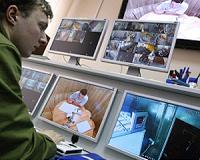 |
Moscow (AFP) May 4, 2010 A group of volunteers have started final training in Russia in preparation for being locked up in a capsule for 520 days to simulate the psychological effects of the voyage to Mars. Three Russians, two other Europeans and one Chinese national will be shut away for one-and-a-half years inside the 180-square-metre (1,000-square-feet) module on the outskirts of Moscow starting late May or early June. The project, the first full-duration simulated mission to Mars, follows a similar experiment at the Russian Institute for Biomedical Problems (IBMP) last year which saw six volunteers shut away for a mere 105 days. One of the biggest unknowns of an eventual manned mission to Mars will be the psychological effects of the isolation, and the experiment aims to garner crucial data on the participants' state of mind and body. The volunteers are now undergoing tests and training in Moscow ahead of the final selection of the "expedition" crew and their back-up. "The biggest risk of such an isolation is psychological," said researcher Alexander Suvorov who is leading the experiment at the IBMP. "Of course relations between the crew will not always be harmonious, some will get on with others, others will not. But the priority is to be able to carry out tasks in spite of this." The volunteers will have their days divided into eight hours of sleep, eight hours of work and eight hours of leisure. A team of three will spend one month aboard a special module meant to represent the Mars landing craft, while two will also spend time exploring a reconstruction of Mars itself. The idea is to exactly mimic the timescale of a Mars mission -- 250 days for the trip to Mars, 30 days on the surface and 240 days for the return journey, totalling 520 days. The two non-Russian European members of the team still have to be chosen from a shortlist of three. But the candidates all dismiss the notion they are crazy to be voluntarily locked up for such a period, underlining their enthusiasm for space travel. "I am doing this above all because this has been a passion since I was young," said Jerome Clevers, 28, a Belgian. "The conquest of space allows humanity to live better and the next conquest is Mars," he added. "Boredom will be one of the greatest enemies in the mission, he admitted. For Frenchman Romain Charles, 30, the hardest thing will be the disruption of contact "with the family, the girlfriend, the friends with whom the distance is going to be difficult to manage." "And also the sun, fresh air. We will not have this -- there is not going to be a window in the module." The diet will be no different to that enjoyed by real-life astronauts on the International Space Station and the crew will be given the food at the beginning of the experiment, forcing them to ration out their supplies. The experiment is a joint venture between the IBMP and the European Space Agency (ESA), which describes the project as a mission "to mimic a full mission to Mars and back as accurately as possible without actually going there." "This mission might lack some of the glory and feeling of the real spaceflight, but it will be just as tough," said ESA. The ESA and the US space agency NASA have separately sketched dates in around three decades from now for a manned flight to Mars. The Red Planet's distance from Earth varies between 55 million kilometres (34 million miles) and more than 400 million kilometres (250 million miles), depending on where the two planets are in their respectives orbits.
Share This Article With Planet Earth
Related Links Mars News and Information at MarsDaily.com Lunar Dreams and more
 Four Europeans on shortlist for simulated Mars mission
Four Europeans on shortlist for simulated Mars missionNoordwijk, Netherlands (AFP) March 22, 2010 Four Europeans vying to become guinea pigs for a 500-day simulated mission to Mars said Monday they were proud to be putting their young lives on hold for the sake of scientific advancement. "I want to help humanity take a step forward by improving our level of knowledge," 28-year-old Belgian Jerome Clevers said at the European Space Agency's (ESA) offices in Noordwijk in the western Netherl ... read more |
|
| The content herein, unless otherwise known to be public domain, are Copyright 1995-2010 - SpaceDaily. AFP and UPI Wire Stories are copyright Agence France-Presse and United Press International. ESA Portal Reports are copyright European Space Agency. All NASA sourced material is public domain. Additional copyrights may apply in whole or part to other bona fide parties. Advertising does not imply endorsement,agreement or approval of any opinions, statements or information provided by SpaceDaily on any Web page published or hosted by SpaceDaily. Privacy Statement |